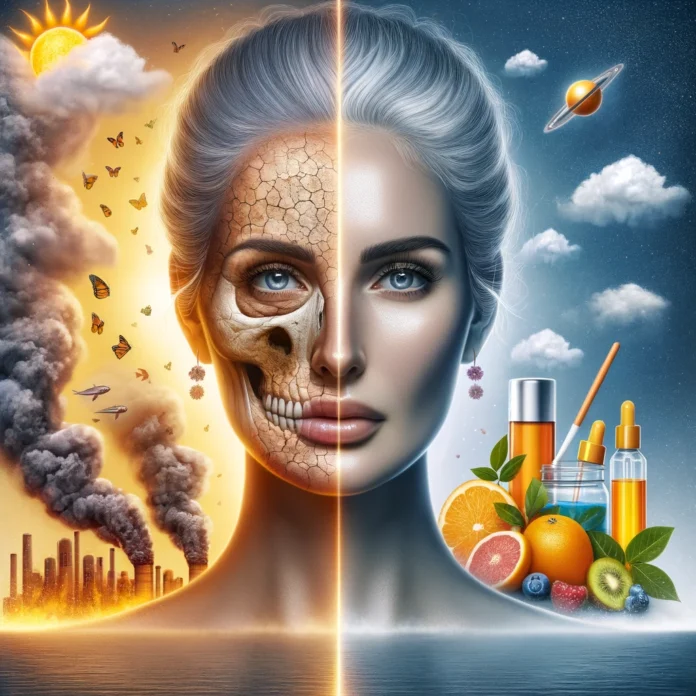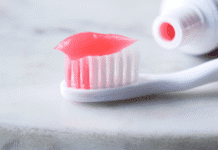Last Updated on September 26, 2024 by Nadeem Ahmed
The health of our skin is significantly influenced by various environmental factors, which can accelerate the aging process. Understanding these factors and taking appropriate measures can help protect and rejuvenate your skin.
Table of Contents
The Impact of Pollution and UV Rays on Your Skin’s Youth
Our skin’s appearance and health are greatly affected by environmental elements like pollution and UV radiation. Let’s delve into how these factors contribute to premature skin aging.
The Sun’s Destructive Role: Understanding UV Radiation
The sun, a vital source of energy and warmth, is indispensable for life on Earth. However, it’s a double-edged sword when it comes to our skin’s health. Prolonged and unprotected exposure to the sun’s rays can have detrimental effects on our skin, primarily due to ultraviolet (UV) radiation, which is a key factor in skin aging.
UVA Rays: The Stealthy Skin Agers
UVA rays constitute the majority of UV radiation reaching the Earth’s surface and can penetrate deep into the layers of the skin. Unlike UVB rays, which are more intense during certain times of the day and year, UVA rays are present with relatively equal intensity during all daylight hours throughout the year. They can even penetrate through clouds and glass, making daily protection essential.
The deep penetration of UVA rays leads to damage to the skin’s structural proteins, particularly collagen and elastin. These proteins are crucial for maintaining the skin’s firmness and elasticity. When they are damaged, the skin loses its youthful structure, resulting in the formation of wrinkles and a sagging appearance. Over time, this leads to a significant loss of skin elasticity and the visible signs of aging that many of us wish to avoid.
UVB Rays: The Surface Skin Burners
UVB rays are more intense than UVA rays and are primarily responsible for causing sunburn. They affect the outermost layers of the skin and are a key player in the development of skin cancer. While UVB rays do not penetrate as deeply as UVA rays, their impact on the skin’s surface is profound.
The damage caused by UVB rays leads to changes in the skin’s texture and color. The outer layer of the skin thickens as a protective response, and over time, this can result in a leathery, rough texture. Additionally, UVB rays stimulate the production of melanin, the pigment that gives our skin its color. This can lead to the formation of age spots and uneven skin tone, further contributing to the aged appearance of the skin.
The Combined Effect of UVA and UVB Rays
The combined effect of UVA and UVB rays on the skin is cumulative and can lead to significant skin aging over time. While UVA rays are responsible for deep structural damage, UVB rays contribute to surface damage and skin cancer risk. Together, they form a formidable force that accelerates the aging process, making sun protection an essential part of any skincare routine.
To protect your skin from the aging effects of UV radiation, it’s important to use a broad-spectrum sunscreen that provides protection against both UVA and UVB rays. Applying sunscreen daily, even on cloudy days, and reapplying every two hours when outdoors can help minimize the damage caused by UV radiation and keep your skin looking youthful for longer.
The Hidden Enemy: How Pollution Affects Your Skin
Pollution is another significant threat to our skin, with pollutants causing various detrimental effects:
- Free Radical Generation: Similar to UV rays, pollutants create free radicals that damage skin cells and collagen.
- Barrier Disruption: Pollution can weaken the skin’s protective barrier, leading to dehydration and increased sensitivity.
- Inflammation: Chronic exposure to pollutants can cause inflammation, further accelerating skin aging.
Protecting Your Skin from Environmental Aggressors
Despite these challenges, you can take steps to protect your skin:
- Sun Protection: Use broad-spectrum sunscreen with SPF 30 or higher daily.
- Minimize Pollution Exposure: Avoid areas with high pollution levels when possible.
- Regular Cleansing: Cleanse your skin daily to remove pollutants.
- Antioxidant-Rich Diet: Eat foods high in antioxidants to counteract free radicals.
- Stay Hydrated: Drink plenty of water to keep your skin hydrated.
- Antioxidant Skincare: Use skincare products with antioxidants like vitamins C and E.
Morpheus8 in Winter Park: Revitalizing Your Skin
Morpheus8 is a minimally invasive treatment that addresses sun damage and signs of environmental aging by stimulating collagen production and tightening the skin. It’s an effective solution for reducing wrinkles, sun damage, and scars.
By incorporating protective measures and treatments like Morpheus8 into your skincare routine, you can mitigate the impact of environmental factors on your skin. Prevention is key to maintaining a youthful and healthy complexion.
A Holistic Approach to Maintaining Youthful Skin
Adopting a comprehensive approach that includes preventive measures, a healthy lifestyle, and advanced treatments like Morpheus8 can help you effectively counteract the aging effects of environmental factors. Consistency in skincare is essential for achieving and maintaining a radiant complexion.
At YMD Facial Plastic Surgery, we are dedicated to assisting you in reaching your skincare objectives through personalized treatment plans and cutting-edge technology. Contact us to explore how Morpheus8 in Winter Park and other skincare treatments can benefit you.
















